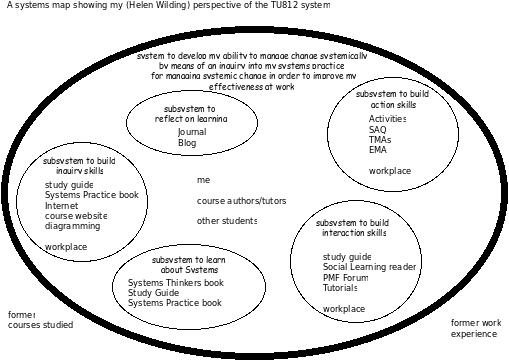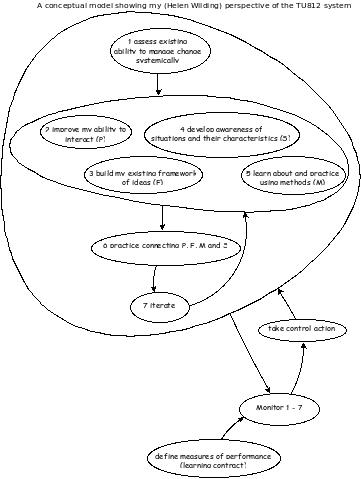(Activity 1.6;Activity 1.7; Activity 1.11)
In activity 1.7 we were asked to play on the idea that TU812 is an “inquiry into my systems practice for managing systemic change”
let’s break this down a little:
- an inquiry – the course defines this as a process…a form of practice…a disposition. Used in the sense of an exploration or investigation (study guide page 29)
- systems practice – a form of practice that draws on systems thinking. (study guide page 21)
- managing systemic change – managing change in ways that strive to avoid systemic failure and associated unintended consequences (study guide page 15)
If I take those ideas into Activity 1.11 and use them to define the purpose of TU812 using the PQR formula, I get:
A system to…develop my ability to manage change systemically…by means of…an inquiry into my systems practice for managing systemic change…in order to…improve my effectiveness at work.
Activity 1.6 asks us to construct a System Map of TU812. This needs to show the components of the system (study guide page 146).
Back to activity 1.11, the Transformation process for my system is as follows:
| input | transformation
process |
output |
| me with existing level of ability to manage change systemically |
inquiry into practice | me with better level of ability to manage change systemically |
And, my full system definition (using SSM’s root definition method) is:
| My system, | Owner |
| enacted by me | Actor |
| for my own benefit, | Customer |
| to develop my ability to manage change systemically | P |
| improving that ability | Transformation Process |
| by means of an inquiry into my systems practice for managing systemic change | Q |
| in order to improve my effectiveness at work, | R |
| recognising that I can only study when I have free time and I must meet course deadlines | Environmental Constraints |
| in the belief that systems practice is a vital management skill when dealing with complexity | Worldview |
A conceptual model is used to represent the steps that are logically implied by the system definition, as a form of purposeful activity model (see also study guide page 149)
This is scary – my purposeful activity will never end! Doing TU812 is obviously a time when I will be doing it more intensively than at other times, but I seem to see it as the beginning, rather than as an isolated bounded system.
Update 30 November 2010
I have moved into the Part 2 of TU812 now. Ison (2010, 248)* shows an activity model of a system to conduct a systemic inquiry. My root definition above says “by means of an inquiry into my systems practice for managing change”, so I thought I would reflect on how the different activities in the Ison’s model help me develop the thoughts I had above.
set up structured exploration of situation considered problematical – the situation I consider problematical is that I need improved capacity to manage systemic change. I suppose the first structured thing I did about this was enroll on TU812. The good thing about being on a formal course is that the structured bit has been done for me – the course team have created that structure for me and the other students.
make sense of situation by exploring context (culture, politics) using systems models as devices – Part of the context is historical, my story that got me to this point but it is also wider than that – as someone who lives and works in the UK, the hegemony I am subjected to does not value systems literacy and therefore organisations are not organised in a way that enables it to flourish. Part 2 will provide me with a systems model that I can use as a device to make sense of the situation further.
tease out possible accommodations between different interests & define possible actions to change that are systemically desirable and culturally feasible – both of these activities requires me to engage with others.
take action to change creating new situation – I have to keep remembering this is about praxis – how it changes what I do when I do what I do – not just about more reading.
* Ison, R. (2010) Systems Practice: how to act in a climate-change world, Springer/Open University, London/Milton Keynes




Hi Helen,
I am keeping up with all your postings and am very impressed with your output, it is spurring me on to do more myself and to try to contribute where I can. I am not as pro-active as you or as used to applying my learning in different situations but I hope this course will help me to recognise opportunities for better practice. Best wishes, James.
Thanks James